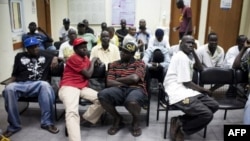JERUSALEM - Israeli security officials have arrested 62 African migrants in the past two days as part of a new operation to deport illegal aliens. Human rights activists are protesting, saying the government should first determine their asylum status.
The migrants are mostly from South Sudan.
A local representative of Human Rights Watch, Bill Van Esveld, said the move points to an alarming trend by the Israeli government.
"Arrests should only be used as a last resort. Israel has basically an ad-hoc and very disorganized immigration system. It doesn't really have much of a policy when it comes to anyone who is not Jewish," Van Esveld said.
He notes that the government has been increasingly concerned over growing numbers of immigrants, primarily from Africa, who are slipping across the 240-kilometer-long border with Egypt.
The Israeli parliament passed a law this year allowing the government to detain any person who sneaks into the country.
Van Esveld says arrests began after the government announced it would begin enforcing the law.
"The problem with this measure is that it allows for the potential indefinite detention of asylum seekers who are crossing the Egyptian border with Israel irregularly. And the problem there is that this flies in the face of Israel's obligations under the Refugee Convention," Van Esveld
Van Esveld says the Israeli government has a duty to determine whether any refugee will face persecution if returned home. But he says the government makes the process difficult and approves asylum in less than one percent of the cases.
The Office of the U.N. High Commissioner for Refugees says about 60,000 Africans have entered Israel in the past seven years. Eighty-five percent are Eritrean or northern Sudanese. Most say they fear persecution in their home countries.
The Israeli government believes that most are seeking work. The migrants' Israeli supporters say that is not necessarily true and the government should investigate each case individually.
Analysts say the Israeli government is under increasing pressure because of recent attacks by extremist Israelis against African migrants whom they blame for rising crime rates - despite government figures to the contrary.
Israeli Interior Minister Eli Yishai said the government would begin enforcing the law against South Sudanese first.
A leader of the South Sudanese community in the Israeli border city of Eilat, Moses Gadia, said many South Sudanese had heard the deportations were about to begin and had prepared to leave voluntarily.
"All the community is going to register and they are waiting for when they are going to leave the country. We are surprised by why they are taking people to prison," Gadia said.
Migrants from other African countries have been detained, including from Nigeria, Ghana and Ivory Coast.
Hundreds of African migrants marched Sunday to the U.N. Refugee Agency offices in Tel Aviv, protesting against the mistreatment of refugees in Israel.
Human Rights Watch also criticized some Israeli politicians for inflammatory remarks about migrants. Prime Minister Benjamin Netanyahu has condemned the violence against them though he supports the deportation measures.
The migrants are mostly from South Sudan.
A local representative of Human Rights Watch, Bill Van Esveld, said the move points to an alarming trend by the Israeli government.
"Arrests should only be used as a last resort. Israel has basically an ad-hoc and very disorganized immigration system. It doesn't really have much of a policy when it comes to anyone who is not Jewish," Van Esveld said.
He notes that the government has been increasingly concerned over growing numbers of immigrants, primarily from Africa, who are slipping across the 240-kilometer-long border with Egypt.
The Israeli parliament passed a law this year allowing the government to detain any person who sneaks into the country.
Van Esveld says arrests began after the government announced it would begin enforcing the law.
"The problem with this measure is that it allows for the potential indefinite detention of asylum seekers who are crossing the Egyptian border with Israel irregularly. And the problem there is that this flies in the face of Israel's obligations under the Refugee Convention," Van Esveld
Van Esveld says the Israeli government has a duty to determine whether any refugee will face persecution if returned home. But he says the government makes the process difficult and approves asylum in less than one percent of the cases.
The Office of the U.N. High Commissioner for Refugees says about 60,000 Africans have entered Israel in the past seven years. Eighty-five percent are Eritrean or northern Sudanese. Most say they fear persecution in their home countries.
The Israeli government believes that most are seeking work. The migrants' Israeli supporters say that is not necessarily true and the government should investigate each case individually.
Analysts say the Israeli government is under increasing pressure because of recent attacks by extremist Israelis against African migrants whom they blame for rising crime rates - despite government figures to the contrary.
Israeli Interior Minister Eli Yishai said the government would begin enforcing the law against South Sudanese first.
A leader of the South Sudanese community in the Israeli border city of Eilat, Moses Gadia, said many South Sudanese had heard the deportations were about to begin and had prepared to leave voluntarily.
"All the community is going to register and they are waiting for when they are going to leave the country. We are surprised by why they are taking people to prison," Gadia said.
Migrants from other African countries have been detained, including from Nigeria, Ghana and Ivory Coast.
Hundreds of African migrants marched Sunday to the U.N. Refugee Agency offices in Tel Aviv, protesting against the mistreatment of refugees in Israel.
Human Rights Watch also criticized some Israeli politicians for inflammatory remarks about migrants. Prime Minister Benjamin Netanyahu has condemned the violence against them though he supports the deportation measures.





